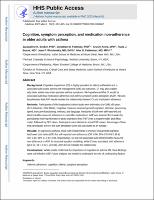Please use this identifier to cite or link to this item:
https://hdl.handle.net/20.500.12202/9820| Title: | Cognition, symptom perception, and medication non-adherence in older adults with asthma |
| Authors: | Feldman, Jonathan Becker, Jacqueline H Arora, Arush Busse, Paula J. Wisnivesky, Juan P. Federman, Alex D.. 0000-0002-7326-3026 |
| Keywords: | Asthma adherence cognition elderly sympton perception |
| Issue Date: | Mar-2022 |
| Publisher: | Informa Healthcare |
| Citation: | Becker, J. H., Feldman, J. M., Arora, A., Busse, P. J., Wisnivesky, J. P., & Federman, A. D. (2022). Cognition, symptom perception, and medication non-adherence in older adults with asthma. Journal of Asthma, 59(3), 607–615. https://doi-org.ezproxy.yu.edu/10.1080/02770903.2020.1856867 |
| Series/Report no.: | Journal of Asthma;59(3) |
| Abstract: | Background: Cognitive impairment (CI) is highly prevalent in elderly asthmatics and is associated with worse asthma self-management (SM) and outcomes. CI may also explain why older adults may under-perceive asthma symptoms. We hypothesized that CI would be associated with low medication adherence and asthma symptom under-perception (ASP). We also hypothesized that ASP would mediate the relationship between CI and medication adherence. Methods: Participants of this longitudinal cohort study were asthmatics (N = 334) 60 years (51% Hispanic, 25% Black). Cognitive measures assessed general cognition, attention, processing speed, executive functioning, memory, and language. Measures of SM were self-reported and electronically measured adherence to controller medications. ASP was assessed for 6 weeks by participants entering estimates of peak expiratory flow (PEF) into a programmable peak flow meter, followed by PEF blows. Participants were blinded to actual PEF values. Percentage of time that participants were in the over-perception zone was calculated as an average. Results: In regression analyses, those with impairments in memory and general cognition had lower odds ratios (OR) for self-reported non-adherence (OR: 0.96, 95% CI 0.93 0.98 & OR: 0.90, 95% CI 0.83 0.96, respectively). CI was not associated with electronically measured non-adherence or ASP. In structural equation modeling, while CI was associated with adherence (β = 0.04, SE = 0.021, p = 0.04), ASP did not mediate this relationship. Conclusions: While results confirmed the importance of cognition in asthma SM, these findings were not linked to ASP. Future analyses are needed to understand the role of confounding factors. (PsycInfo Database Record (c) 2023 APA, all rights reserved) |
| Description: | Scholarly article / Open Access |
| URI: | https://hdl.handle.net/20.500.12202/9820 |
| ISSN: | 0277-0903 (Print) 1532-4303 (Electronic) |
| Appears in Collections: | Ferkauf Graduate School of Psychology: Faculty Publications |
Files in This Item:
| File | Description | Size | Format | |
|---|---|---|---|---|
| Feldman 2022 Cognition symptoms OA nihms-1664370.pdf | 370.81 kB | Adobe PDF |  View/Open |
This item is licensed under a Creative Commons License

